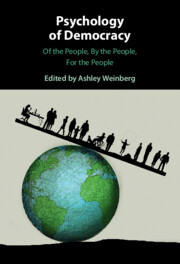Book contents
- Psychology of Democracy
- Psychology of Democracy
- Copyright page
- Contents
- Figures
- Tables
- Contributors
- Preface
- Acknowledgements
- Chapter 1 Psychology of Democracy
- Part I Of the People
- Chapter 2 Personality, Politics and Strong Democracy
- Chapter 3 From Big Ben to the Breakfast Table
- Chapter 4 Under the Microscope:
- Chapter 5 Cognitive Complexity:
- Chapter 6 In ‘A League of Their Own?’
- Chapter 7 The Mental Well-Being of Politicians
- Part II By the People
- Part III For the People
- Index
- References
Chapter 2 - Personality, Politics and Strong Democracy
A Review of Research and Future Directions
from Part I - Of the People
Published online by Cambridge University Press: 24 February 2022
- Psychology of Democracy
- Psychology of Democracy
- Copyright page
- Contents
- Figures
- Tables
- Contributors
- Preface
- Acknowledgements
- Chapter 1 Psychology of Democracy
- Part I Of the People
- Chapter 2 Personality, Politics and Strong Democracy
- Chapter 3 From Big Ben to the Breakfast Table
- Chapter 4 Under the Microscope:
- Chapter 5 Cognitive Complexity:
- Chapter 6 In ‘A League of Their Own?’
- Chapter 7 The Mental Well-Being of Politicians
- Part II By the People
- Part III For the People
- Index
- References
Summary
This chapter examines how the personality of political leaders shapes their ability to campaign effectively, win votes and achieve success once in political office. We begin by examining how personality has been conceptualised in politics and why it is considered important. In our discussion of personality, we include psychological traits, such as the ‘big five’ (e.g., Extroversion, Conscientiousness), and Machiavellianism or charisma, but also individual characteristics including motivation, intelligence and traits ascribed to individuals based on their biological features, such as height. Next, we review existing research to examine the relevance of personality for leadership emergence (i.e. how personality contributes to individuals becoming political leaders), and leadership effectiveness (i.e. how personality may contribute to successful performance in political office). Finally, we examine the methods that researchers have used to examine personality and political leadership and consider future directions for research. The use of relevant measures of personality is considered as well as enhanced approaches to their analysis.
- Type
- Chapter
- Information
- Psychology of DemocracyOf the People, By the People, For the People, pp. 25 - 51Publisher: Cambridge University PressPrint publication year: 2022

